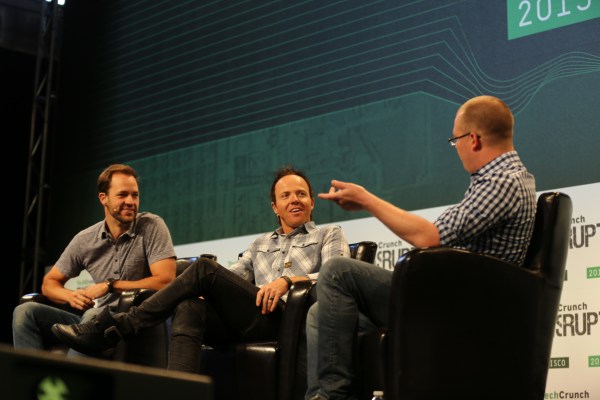Qualtrics spent most of its life bootstrapped and trying to be profitable. Then it raised $220 million — and Qualtrics CEO Ryan Smith was worried he’d have to move to Silicon Valley.
But the company has become a success story coming out of Utah, and the company’s focus on profitability and being a sustainable business from day one has taught Qualtrics’ employees to remain scrappy even with the huge funding it has pulled into the bank.
“You really have to kind of be blunt, eat what you kill,” Smith said onstage at TechCrunch Disrupt SF 2015. “It forces constraint, and when people are constrained, they get extremely creative and scrappy. It’s everything — it’s hustle, you gotta be innovative. ‘Were going to this trade show, figure out, can you can get this booth for free because we can’t afford it.’ It’s built into the DNA that we area actually running a solid business model.”
Qualtrics is a platform that makes it easier to monitor and “improve the vital signs of a company,” he said. It was founded in 2002, and it wasn’t until May 2012 when it raised its first massive round of funding — a $70 million series A from Sequoia Capital and Accel Partners.
“The key word was DNA,” Sequoia’s Bryan Schreier said. “They started with a small number of sales. The last few years have been taking that profitable bootstrapped DNA, and learning the behaviors of investing aggressively in the business. It’s almost the opposite of what you see coming out of startups coming out of Silicon Valley.”
There’s certainly been change internally, Smith said, and Qualtrics doesn’t look like what it did when it was founded. The funding round was another “checkpoint,” Smith said when it led to another change in the direction of the company. “We had to take what we loved about it, but we also had to rip down what we did to this point.”
Schreier worked with Smith’s co-founder Jared Smith at Google back in 2004, giving Sequoia the connection with Qualtrics that helped close the deal, he said. The two were meeting up over coffee to catch up when the conversation initially started. But that’s not to say that there wasn’t some turmoil internally over raising a big round of funding if the company was focused on profitability.
“I think there was a lot of pushback [internally],” Smith said. “One reason we bootstrapped so long was because when I started with my father, we said, ‘we’ll split this 50/50′. It really had to line up not only economically, but also the right folks on our end. Both [Schreier] and [Accel Partners’ Ryan Sweeney], they saw a vision for what we were working on. Jared was really comfortable with [Schreier].”
But for Schreier, it was attractive because it was quite different to other Silicon Valley SaaS companies that were focused entirely on growth without at least generating some profitability.
“It’s always the team, but the data point it was simply the financial attributes,” Schreier said. “The revenue, the growth rate with profitability. To this day this is the only company at tremendous scale in SaaS industry that is growing at the high rate and still generating tons of cash. It does not happen in B2B.”
